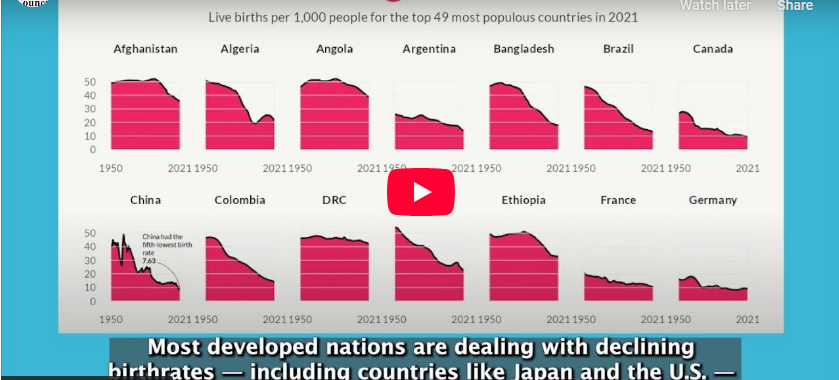Preschools Close as China’s Family Crisis Deepens

A recent article at The American Spectator highlights how anti-family policies have contributed to China’s looming population crisis.
Ellie Gardey Holmes writes,
Data released by China’s Ministry of Education last month revealed an astonishing reality: In the past two years alone, 36,000 preschools across China have shuttered their doors.
This is not due to a decline in the popularity of preschool or consolidation on the part of the Chinese government. Rather, these preschools have closed simply because not enough children to attend them were born.
The article notes that births in China have dropped by nearly half since 2016, and there are some 12 million fewer preschoolers in China today than in 2020. Many of these problems seem to trace back to China’s communist government enforcing a strict “one-child” policy for many years. Even though the government has abandoned that policy, fewer families are forming in China.
This is not the first time pundits have expressed concern over China’s declining population. In 2020, officials from the Chinese Communist Party said China’s fertility rate had fallen to dangerously low levels, with fewer couples marrying and starting families. In early 2023, China’s National Bureau of Statistics released data showing the country’s population had begun plummeting. And last year The Guardian reported that several kindergartens in China had been converted into elderly care facilities as a result of the country’s falling birthrate and aging population.
Most developed nations are dealing with declining birthrates — including countries like Japan and the U.S. — but not to the same degree as China.
Without a growing population, it’s difficult for countries to maintain strong communities, a vibrant workforce, or a healthy economy. The Chinese Communist Party spent decades promoting the idea that having fewer children would be good for China, but that simply is not how society works.
Societies thrive off healthy, stable families. That’s part of the reason Family Council has spent more than 35 years promoting, protecting, and strengthening traditional family values in Arkansas. When families succeed, everyone benefits.
Articles appearing on this website are written with the aid of Family Council’s researchers and writers.
UPenn Will Finally Revoke Transgender Swimmer’s Medals, Apologize to Female Athletes

The Washington Stand reports the University of Pennsylvania plans to revoke transgender swimmer “Lia” Thomas’ medals and apologize to female athletes forced to compete against Thomas.
In 2022, Thomas — a biological male who claims to be female — made headlines for shattering women’s swimming records and winning the women’s 500-yard freestyle at the NCAA Division I championship.
The NCAA even went so far as to nominate Thomas for its 2022 Woman of the Year Award.
However, in 2024 a group of female athletes filed a lawsuit arguing the NCAA violated their federal rights under Title IX by letting Thomas compete as a woman.
Earlier this year, President Trump signed an executive order protecting fairness in women’s sports under Title IX. As a result, the U.S. Department of Education says UPenn has agreed to restore female athletes’ swimming records, issue apologies to female swimmers, and take steps to make sure biological males don’t compete in women’s athletics.
All of this reminds us once again that ignoring basic biological realities about male athletes and female athletes robs women of opportunities to receive recognition for their achievements.
Letting men compete in women’s sports reverses 50 years of advancements for women and effectively erases women’s athletics.
It hampers their abilities to compete for athletic scholarships, and it hurts their professional opportunities as adults. In some sports, it can even be dangerous.
In 2021 Arkansas passed Act 461 by Sen. Missy Irvin (R — Mountain View) and Rep. Sonia Barker (R — Smackover) preventing male student athletes from competing against girls in women’s athletics at school. This good law protects fairness in women’s sports in Arkansas.
At the time, some people questioned if it was really necessary to pass Act 461, but four years later, it’s clear Arkansas lawmakers made the right call. Since then, some 29 states have passed similar measures protecting fairness in women’s sports.
It’s also worth mentioning that pollsters at Gallup have found most Americans agree that athletes should compete according to their biological sex — not their gender identity.
We deeply appreciate our elected leaders and policymakers who work hard to protect fairness in women’s sports both in Arkansas and across the country.
Articles appearing on this website are written with the aid of Family Council’s researchers and writers.



